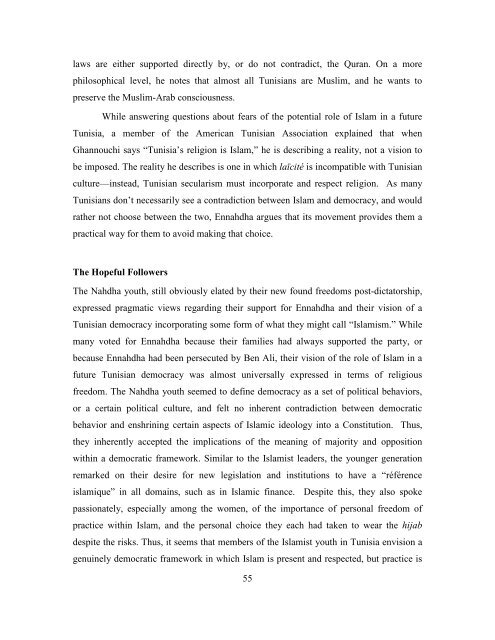Tunisia: Understanding Conflict 2012 - Johns Hopkins School of ...
Tunisia: Understanding Conflict 2012 - Johns Hopkins School of ...
Tunisia: Understanding Conflict 2012 - Johns Hopkins School of ...
Create successful ePaper yourself
Turn your PDF publications into a flip-book with our unique Google optimized e-Paper software.
laws are either supported directly by, or do not contradict, the Quran. On a more<br />
philosophical level, he notes that almost all <strong>Tunisia</strong>ns are Muslim, and he wants to<br />
preserve the Muslim-Arab consciousness.<br />
While answering questions about fears <strong>of</strong> the potential role <strong>of</strong> Islam in a future<br />
<strong>Tunisia</strong>, a member <strong>of</strong> the American <strong>Tunisia</strong>n Association explained that when<br />
Ghannouchi says “<strong>Tunisia</strong>’s religion is Islam,” he is describing a reality, not a vision to<br />
be imposed. The reality he describes is one in which laïcité is incompatible with <strong>Tunisia</strong>n<br />
culture—instead, <strong>Tunisia</strong>n secularism must incorporate and respect religion. As many<br />
<strong>Tunisia</strong>ns don’t necessarily see a contradiction between Islam and democracy, and would<br />
rather not choose between the two, Ennahdha argues that its movement provides them a<br />
practical way for them to avoid making that choice.<br />
The Hopeful Followers<br />
The Nahdha youth, still obviously elated by their new found freedoms post-dictatorship,<br />
expressed pragmatic views regarding their support for Ennahdha and their vision <strong>of</strong> a<br />
<strong>Tunisia</strong>n democracy incorporating some form <strong>of</strong> what they might call “Islamism.” While<br />
many voted for Ennahdha because their families had always supported the party, or<br />
because Ennahdha had been persecuted by Ben Ali, their vision <strong>of</strong> the role <strong>of</strong> Islam in a<br />
future <strong>Tunisia</strong>n democracy was almost universally expressed in terms <strong>of</strong> religious<br />
freedom. The Nahdha youth seemed to define democracy as a set <strong>of</strong> political behaviors,<br />
or a certain political culture, and felt no inherent contradiction between democratic<br />
behavior and enshrining certain aspects <strong>of</strong> Islamic ideology into a Constitution. Thus,<br />
they inherently accepted the implications <strong>of</strong> the meaning <strong>of</strong> majority and opposition<br />
within a democratic framework. Similar to the Islamist leaders, the younger generation<br />
remarked on their desire for new legislation and institutions to have a “référence<br />
islamique” in all domains, such as in Islamic finance. Despite this, they also spoke<br />
passionately, especially among the women, <strong>of</strong> the importance <strong>of</strong> personal freedom <strong>of</strong><br />
practice within Islam, and the personal choice they each had taken to wear the hijab<br />
despite the risks. Thus, it seems that members <strong>of</strong> the Islamist youth in <strong>Tunisia</strong> envision a<br />
genuinely democratic framework in which Islam is present and respected, but practice is<br />
55
















